Draft Acceptance Letter
[Your Name]
[Your Address]
[City, State, Zip Code]
[Email Address]
[Phone Number]
[Date]
[Recipient's Name]
[Company/Organization Name]
[Address]
[City, State, Zip Code]
Dear [Recipient's Name],
I hope this letter finds you in good health and high spirits. I am writing to express my heartfelt gratitude for the offer extended to me for the position of [Job Title] at [Company/Organization Name]. I am thrilled and honored to accept the offer and become a valuable member of your esteemed team.
I would like to take this opportunity to express my gratitude for considering me for this role. After careful consideration and research, I firmly believe that [Company/Organization Name] aligns perfectly with my professional aspirations and values. I am eager to contribute my skills, knowledge, and experience to further the success of the organization.
I am excited about the potential for growth and development that comes with working at [Company/Organization Name]. The positive reputation [Company/Organization Name] holds within the industry, its commitment to excellence, and the emphasis on employee well-being make it an ideal fit for me.
I am confident that my background in [mention relevant experience or skills] will enable me to make meaningful contributions to the team and help achieve the company's objectives. I am committed to collaborating with my colleagues and taking on new challenges to contribute to the organization's continued success.
Regarding the proposed terms and conditions of employment, I am pleased with the details mentioned in the offer letter dated [date of the offer letter]. If there are any additional formalities or documentation required, please let me know, and I will ensure that everything is provided promptly.
I look forward to joining [Company/Organization Name] on [proposed start date]. In the meantime, please feel free to reach out to me if there is any information or preparation required before my official start date.
Once again, thank you for this incredible opportunity, and I am excited to begin this new chapter of my career with [Company/Organization Name].
Sincerely,
[Your Name]
Job Offer Acceptance Letter
Subject: Acceptance of Job Offer - [Position Title]
Dear [Hiring Manager's Name],
I am delighted to formally accept your offer for the position of [Position Title] at [Company Name]. Thank you for providing me with this incredible opportunity to contribute to your team.
As discussed, I understand that my starting salary will be [salary amount] annually, with [benefits details]. My anticipated start date is [date], and I will report to [supervisor's name/department].
I am excited to bring my skills and experience to this role and look forward to contributing to [specific company goal/project]. Please let me know if there are any documents or preparations needed before my start date.
Thank you once again for your confidence in my abilities. I am eager to begin this new chapter with [Company Name].
Sincerely,
[Your Name]
[Your Contact Information]
College/University Admission Acceptance Email
Subject: Acceptance of Admission Offer - [Your Name]
Dear Admissions Committee,
I am thrilled to accept your offer of admission to [University Name] for the [Program Name] program beginning in [Semester/Year].
This opportunity means everything to me, and I am honored to have been selected from such a competitive pool of applicants. I have enclosed my enrollment deposit of [amount] as requested and will complete all remaining enrollment requirements by the specified deadline of [date].
I am particularly excited about [specific program feature, professor, or opportunity] and look forward to contributing to the campus community through [mention specific interests or activities].
Please confirm receipt of this acceptance and let me know the next steps in the enrollment process. I cannot wait to begin my journey at [University Name].
With sincere gratitude,
[Your Name]
[Student ID if provided]
[Contact Information]
Wedding Invitation Acceptance Message
Subject: Joyful Acceptance of Your Wedding Invitation
Dear [Bride's Name] and [Groom's Name],
What wonderful news! I am absolutely delighted to accept your invitation to celebrate your wedding on [date] at [venue].
I wouldn't miss this special day for anything. Watching two of my favorite people commit to a lifetime of love and happiness will be an honor and joy. Please count me in for [number] guests as indicated on the RSVP card.
I have already marked my calendar and made arrangements to ensure I can fully participate in your celebration. If there's anything I can help with in the weeks leading up to your big day, please don't hesitate to ask.
Thank you for including me in this momentous occasion. I'm counting down the days until I can witness your "I dos" and dance at your reception!
With love and excitement,
[Your Name]
Business Proposal Acceptance Letter
Subject: Acceptance of Business Proposal - [Project/Partnership Name]
Dear [Contact Name],
After careful consideration and review with our team, I am pleased to formally accept your business proposal dated [date] for [project/service description].
We are impressed with your comprehensive approach and believe this partnership will be mutually beneficial. We agree to the terms outlined in your proposal, including the project timeline of [duration], deliverables, and the total project cost of [amount].
To proceed, we will need the following next steps completed: [list specific requirements such as contracts, deposits, etc.]. Our legal team will review the formal agreement, and we anticipate having everything finalized by [date].
We look forward to a successful collaboration and are confident that this project will exceed our expectations. Please contact me at [contact information] to discuss the implementation timeline.
Best regards,
[Your Name]
[Title]
[Company Name]
Event Invitation Acceptance Email
Subject: Count Me In! Accepting Your [Event Name] Invitation
Dear [Host's Name],
Thank you for the invitation to [event name] on [date] at [location]. I am excited to accept and will definitely be there!
This sounds like a fantastic opportunity to [mention specific aspect of event - networking, celebration, learning, etc.]. I appreciate you thinking of me for this occasion.
Please let me know if there's anything specific I should prepare or bring. I'm planning to arrive around [time] and can stay until [time] if that works with your schedule.
Looking forward to seeing you and everyone else at what promises to be a memorable event!
Best,
[Your Name]
[Phone Number]
Scholarship Award Acceptance Letter
Subject: Acceptance of [Scholarship Name] Award
Dear [Committee/Organization Name],
I am deeply honored and grateful to accept the [Scholarship Name] award in the amount of [amount]. This recognition means more to me than words can express.
This scholarship will significantly impact my ability to pursue my educational goals at [School Name] in the [Program] program. Without this support, achieving my dream of [career/academic goal] would be much more challenging.
I understand the responsibilities that come with this award, including maintaining a [GPA requirement] and [other requirements]. I am fully committed to upholding these standards and representing your organization with distinction.
I will be sure to keep you updated on my academic progress and would welcome any opportunities to give back to your organization or assist future scholarship recipients.
Thank you again for investing in my future. I will work hard to prove worthy of your confidence.
Sincerely,
[Your Name]
[Student ID]
[Contact Information]
Board Position Acceptance Letter
Subject: Acceptance of Board of Directors Position
Dear [Board Chair/Nominating Committee],
I am honored to accept your invitation to serve on the Board of Directors for [Organization Name]. Thank you for considering me for this important role.
I understand the commitment required and am prepared to dedicate the necessary time and energy to fulfill my duties effectively. My experience in [relevant background] will, I believe, contribute meaningfully to the board's objectives.
I have reviewed the board charter, bylaws, and recent meeting minutes you provided. I am aligned with the organization's mission and excited about the strategic initiatives outlined for the coming year.
Please provide me with the schedule for upcoming meetings and any additional orientation materials. I am available for the next board meeting on [date] and look forward to meeting my fellow board members.
Thank you for this opportunity to serve. I am committed to helping [Organization Name] achieve its goals.
Respectfully,
[Your Name]
[Professional Title]
[Contact Information]
Speaking Engagement Acceptance Email
Subject: Acceptance of Speaking Invitation - [Event Name]
Dear [Event Organizer's Name],
I am delighted to accept your invitation to speak at [Event Name] on [date] at [venue]. Thank you for this opportunity to share my expertise on [topic] with your audience.
As discussed, I will present on "[presentation title]" for approximately [duration] and am happy to participate in a Q&A session afterward. I understand that [number] attendees are expected, and I am prepared to tailor my content accordingly.
I have noted the technical requirements you outlined and will prepare my presentation using [software/format]. Please confirm the final logistics including arrival time, AV setup, and any special instructions.
I am looking forward to contributing to what sounds like an excellent event and meeting your attendees. Please don't hesitate to contact me if you need any additional information.
Best regards,
[Your Name]
[Title/Credentials]
[Contact Information]
What is a Draft Acceptance Letter and Why Do You Need One
A draft acceptance letter is a formal or informal written communication that confirms your agreement to accept an offer, invitation, opportunity, or request. These letters serve as official documentation of your commitment and help establish clear expectations between parties. Whether accepting a job offer, college admission, event invitation, or business proposal, a well-crafted acceptance letter demonstrates professionalism and ensures all parties are aligned on terms and next steps.
The primary purpose is to eliminate ambiguity about your intentions while expressing gratitude for the opportunity presented to you.
Who Should Send Draft Acceptance Letters
- Job candidates accepting employment offers
- Students accepting college or university admissions
- Business professionals accepting board positions or speaking engagements
- Individuals accepting scholarship awards or grants
- People accepting invitations to weddings, events, or special occasions
- Contractors or vendors accepting business proposals
- Volunteers accepting leadership roles in organizations
- Anyone who needs to formally confirm their agreement to participate in an opportunity
When to Send Draft Acceptance Letters
- Immediately after receiving a job offer (within 24-48 hours is professional)
- Upon deciding to accept college admission (before enrollment deadlines)
- After agreeing to speak at conferences or events
- When accepting board positions or volunteer roles
- Before wedding RSVP deadlines
- Following scholarship or award notifications
- After business proposal discussions conclude positively
- When confirming participation in professional development opportunities
- As soon as you've made your decision to avoid keeping others waiting
How to Write and Send Effective Acceptance Letters
Start by expressing genuine gratitude for the opportunity offered. Clearly state that you are accepting the specific offer or invitation, including relevant details like dates, amounts, or terms discussed. Confirm your understanding of key obligations, timelines, and expectations. Address any immediate next steps or requirements needed from your end.
Choose the appropriate communication method - email for quick responses and digital confirmations, formal letters for significant commitments like job offers or board positions. Always proofread carefully before sending, as these communications become part of official records.
End with enthusiasm about moving forward and provide your contact information for any follow-up questions.
Requirements and Prerequisites Before Sending
- Thoroughly review all terms and conditions of the offer
- Confirm you can meet stated requirements and deadlines
- Gather necessary documentation (ID numbers, references, certificates)
- Verify contact information for recipients
- Check organizational protocols or formal procedures required
- Ensure you have decision-making authority if representing others
- Confirm any legal or contractual obligations involved
- Review your calendar for scheduling conflicts
- Prepare for potential immediate responses or requests for additional information
Formatting Guidelines and Best Practices
Keep acceptance letters concise but comprehensive - typically 3-5 paragraphs for formal communications. Use professional language for business contexts and warmer, personal tone for social invitations. Include specific details like dates, amounts, and reference numbers to avoid confusion.
For emails, use clear subject lines that immediately indicate your acceptance. For formal letters, include proper business formatting with addresses and dates. Always express gratitude early in the message and restate key terms to confirm mutual understanding.
Maintain a positive, enthusiastic tone while remaining professional. Avoid excessive casual language in business contexts but don't be so formal that you sound robotic in personal communications.
Follow-up Actions After Sending Acceptance Letters
- Confirm receipt if sending by email (request read receipts when appropriate)
- Mark important dates in your calendar immediately
- Prepare for any orientation or onboarding processes
- Gather required documentation or complete necessary paperwork
- Research the organization, event, or opportunity further
- Set reminders for key deadlines or preparation milestones
- Inform relevant family members, colleagues, or supervisors about your commitment
- Begin any required preparations (presentations, travel arrangements, etc.)
- Follow up if you don't receive confirmation within a reasonable timeframe
Common Mistakes to Avoid
- Delaying your response too long and missing deadlines
- Failing to confirm specific terms and conditions clearly
- Using inappropriate tone for the context (too casual for business, too formal for friends)
- Forgetting to provide your current contact information
- Making assumptions about unstated terms or expectations
- Sending generic responses that don't address specific opportunity details
- Not proofreading for spelling and grammar errors
- Accepting multiple conflicting offers without considering consequences
- Forgetting to express genuine gratitude
- Being unclear about your level of commitment or availability
Pros and Cons of Formal Acceptance Letters
Advantages:
- Creates official documentation of your commitment
- Demonstrates professionalism and reliability
- Helps prevent misunderstandings about terms
- Shows respect for the opportunity and organization
- Provides opportunity to express enthusiasm and gratitude
- Establishes clear timeline and expectations
Disadvantages:
- Takes time to craft properly
- May seem overly formal for casual situations
- Creates binding commitment that may be difficult to change
- Requires careful attention to detail and accuracy
- May prompt additional administrative requirements
Tips and Best Practices for Maximum Impact
- Respond promptly to show respect and professionalism
- Customize each letter to the specific opportunity and recipient
- Use active voice and positive language throughout
- Include specific details that confirm your understanding
- Express genuine enthusiasm without seeming overwhelming
- Keep copies of all acceptance communications for your records
- Research the organization or event to include relevant details
- Consider the recipient's communication style and match it appropriately
- Use professional email signatures with complete contact information
- Follow up appropriately if you don't receive acknowledgment
Elements and Structure of Strong Acceptance Letters
Opening: Clear subject line and professional greeting Gratitude: Express appreciation for the opportunity Acceptance Statement: Explicitly confirm you are accepting Details Confirmation: Restate key terms, dates, and obligations Next Steps: Address immediate requirements or questions Enthusiasm: Show genuine excitement about moving forward Professional Closing: Appropriate sign-off with contact information Attachments: Include any requested documents or forms
The structure should flow logically from gratitude through confirmation to next steps, maintaining a positive and professional tone throughout.

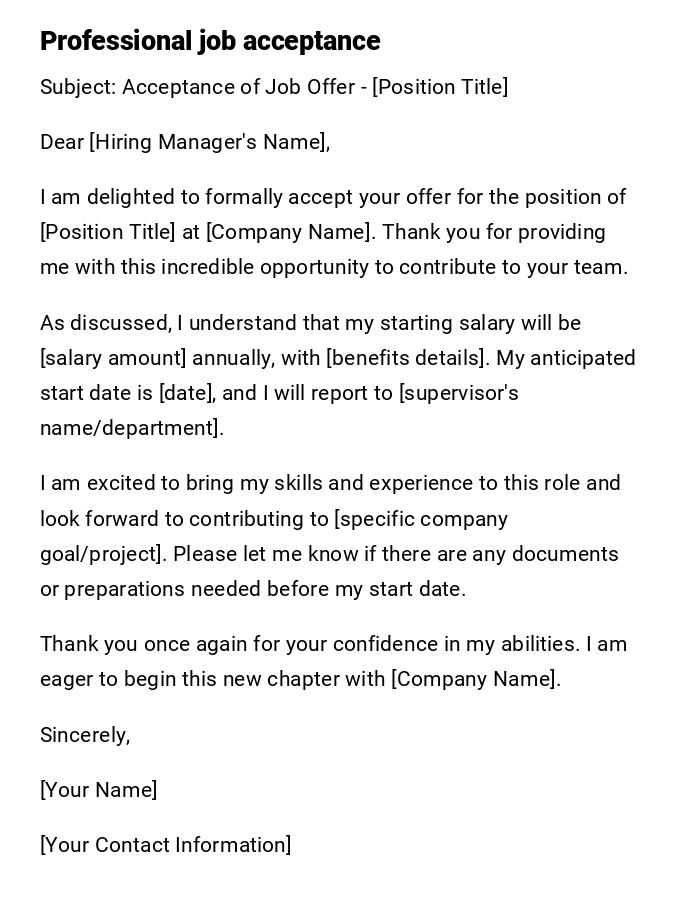
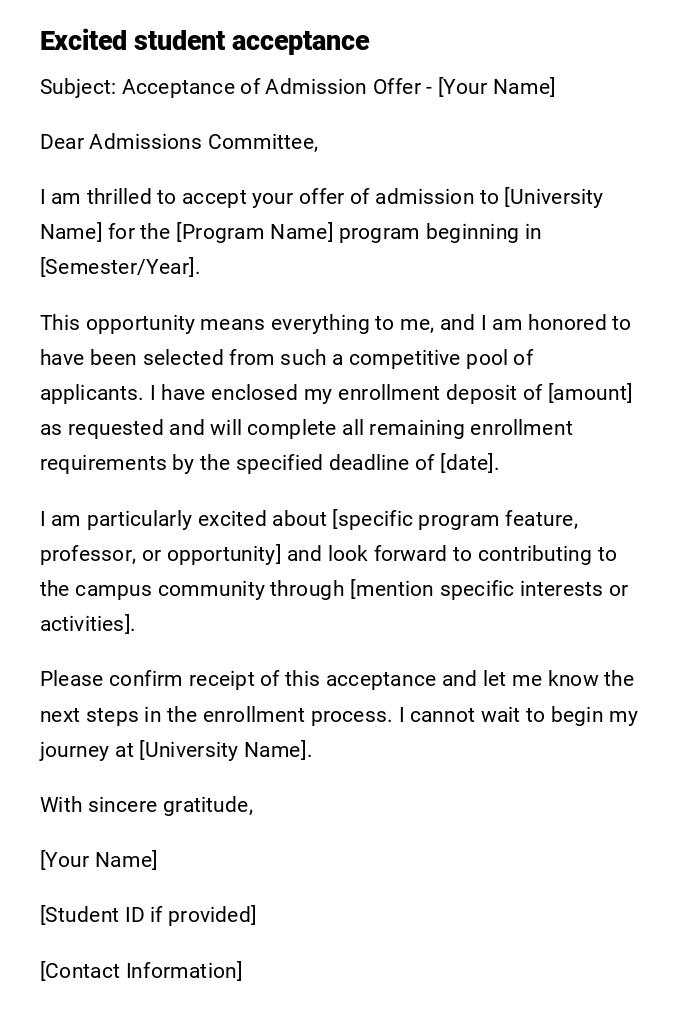
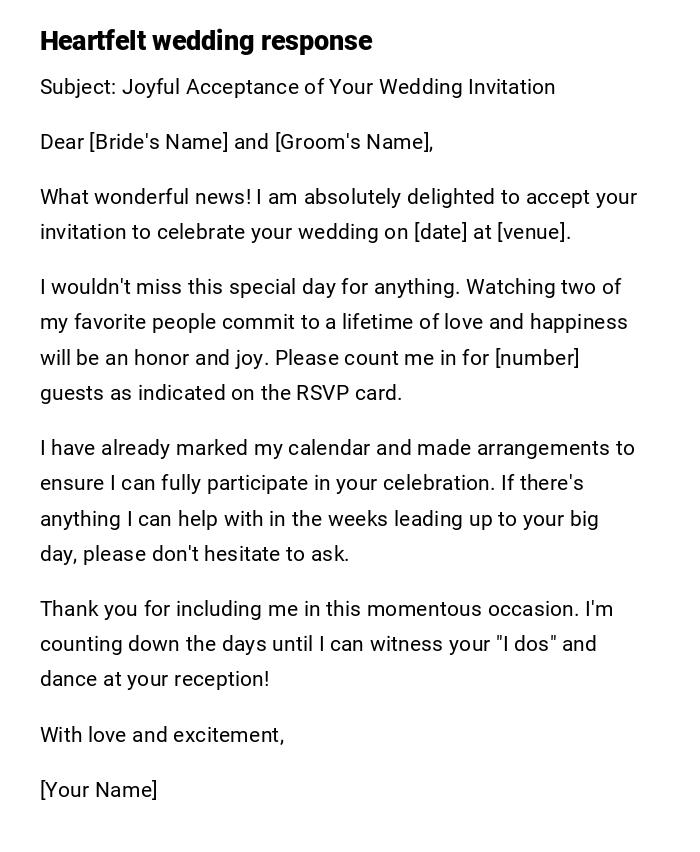
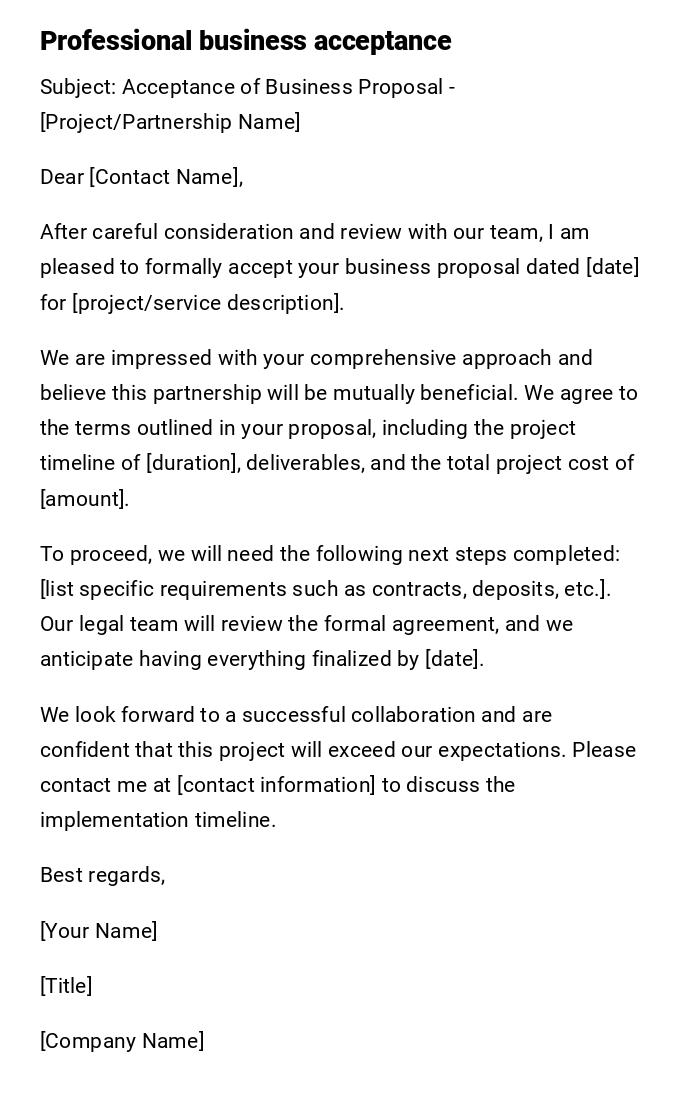
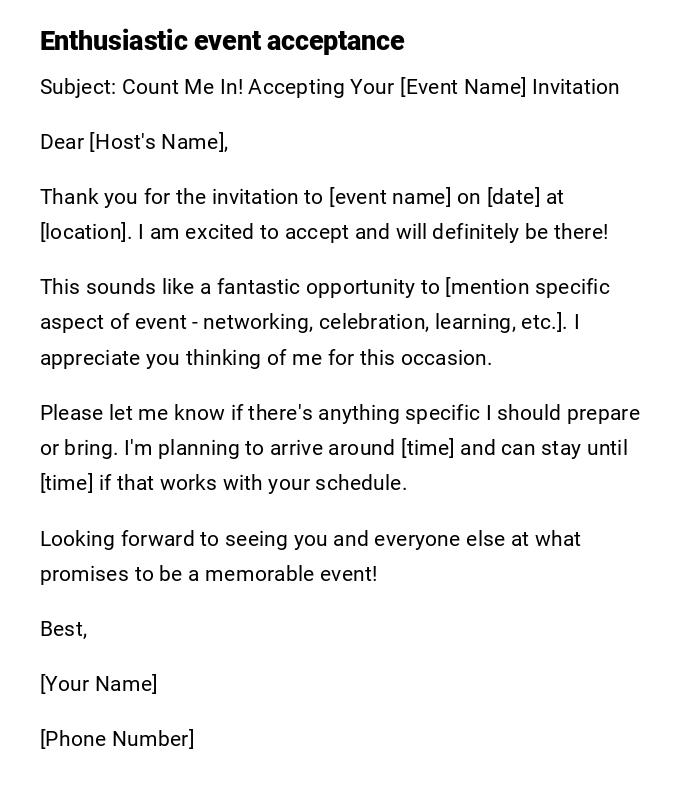
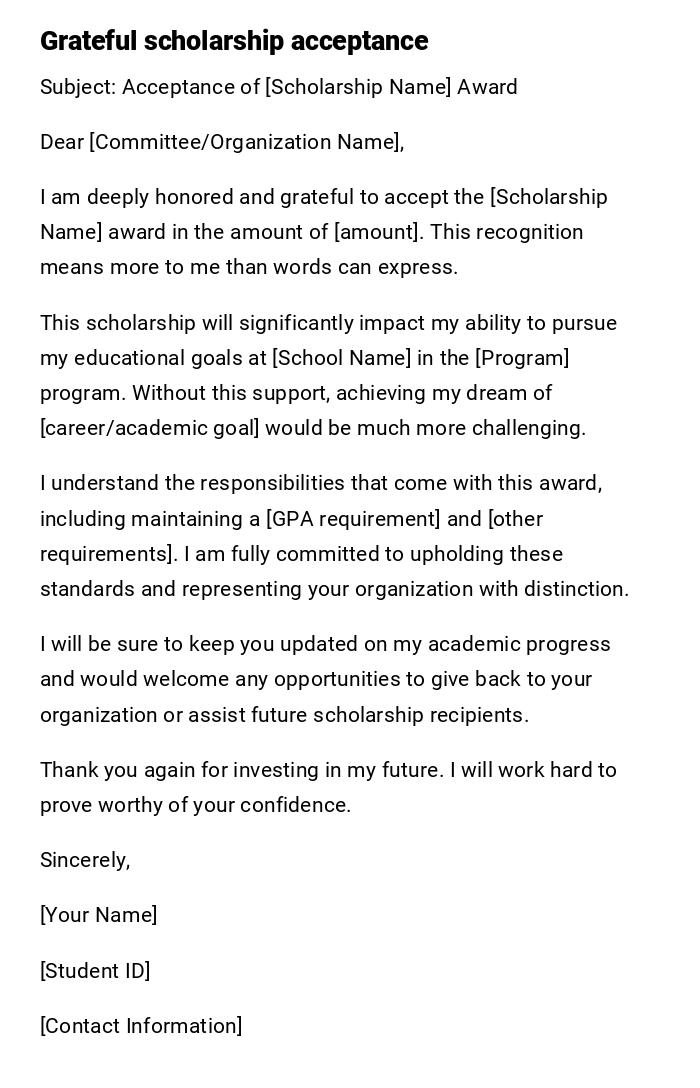
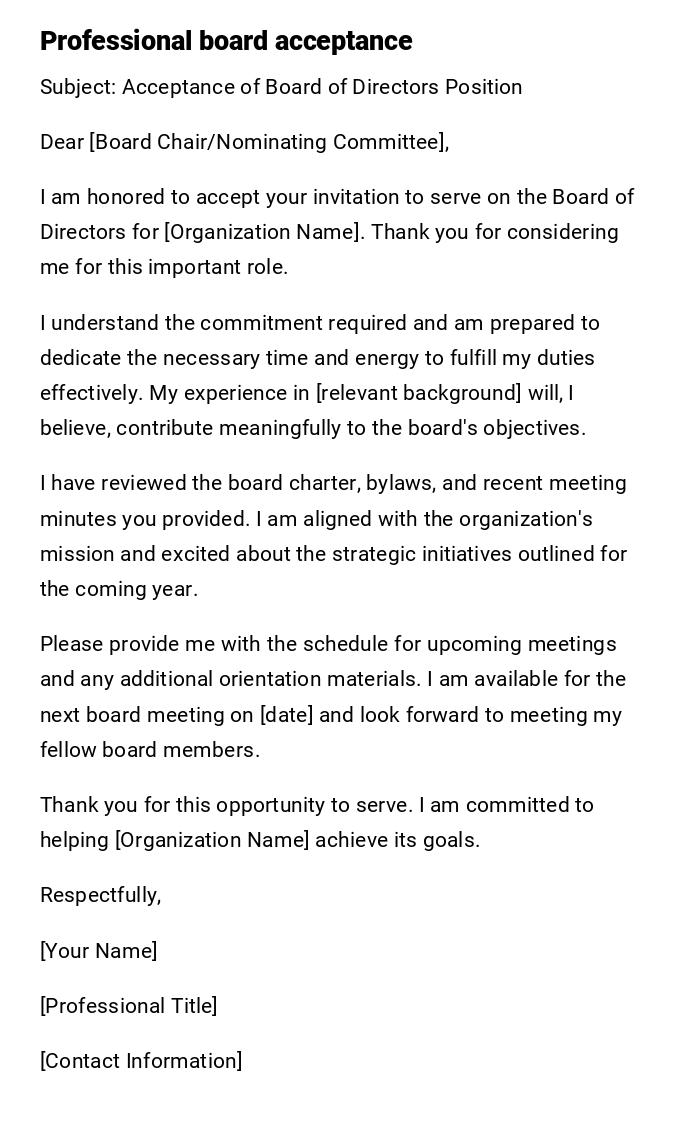
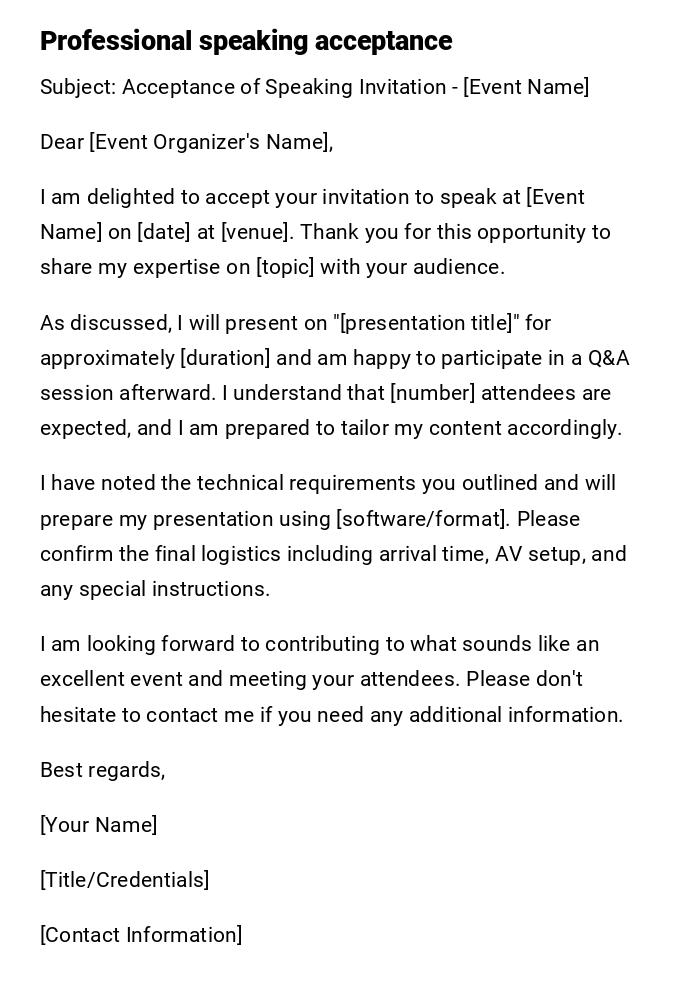

 Download Word Doc
Download Word Doc
 Download PDF
Download PDF